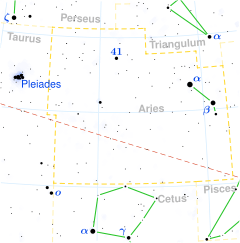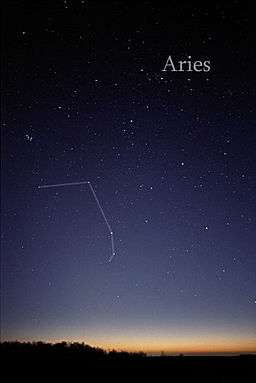Hamal
Hamal /ˈhæməl/,[11] designation Alpha Arietis (α Arietis, abbreviated Alpha Ari, α Ari), is the brightest star in the northern zodiacal constellation of Aries.[4][12]
 | |
| Observation data Epoch J2000.0 Equinox J2000.0 (ICRS) | |
|---|---|
| Constellation | Aries |
| Right ascension | 02h 07m 10.40570s[1] |
| Declination | +23° 27′ 44.7032″[1] |
| Apparent magnitude (V) | 2.00[2] |
| Characteristics | |
| Spectral type | K1IIIb |
| U−B color index | +1.13[2] |
| B−V color index | +1.15[2] |
| V−R color index | +0.7[3] |
| R−I color index | +0.62[4] |
| Variable type | Suspected[5] |
| Astrometry | |
| Radial velocity (Rv) | −14.2 ± 0.9[6] km/s |
| Proper motion (μ) | RA: +188.55[1] mas/yr Dec.: −148.08[1] mas/yr |
| Parallax (π) | 49.56 ± 0.25[1] mas |
| Distance | 65.8 ± 0.3 ly (20.2 ± 0.1 pc) |
| Absolute magnitude (MV) | +0.47 ± 0.04[7] |
| Details | |
| Mass | 1.5 ± 0.2[8] M☉ |
| Radius | 14.9 ± 0.3[9] R☉ |
| Luminosity (bolometric) | 91 ± 6[9] L☉ |
| Surface gravity (log g) | 2.57[9] cgs |
| Temperature | 4,480[9] K |
| Metallicity [Fe/H] | –0.25[9] dex |
| Rotational velocity (v sin i) | 3.44[8] km/s |
| Age | 3.4 ± 1.9[10] Gyr |
| Other designations | |
Hemal, Hamal, Ras Hammel, El Nath, Arietis, α Ari, Alpha Arietis, Alpha Ari, 13 Arietis, 13 Ari, BD+22 306, FK5 74, GC 2538, GJ 84.3, GJ 9072, HD 12929, HIP 9884, HR 617, LTT 10711, NLTT 7032, PPM 91373, SAO 75151.[3][4] | |
| Database references | |
| SIMBAD | data |
With an apparent visual magnitude of 2.0,[2] it is the mean 50th brightest star in the night sky. Based upon parallax measurements made with the Hipparcos astrometry satellite,[13][14] Hamal is about 65.8 light-years (20.2 parsecs) from Earth.[1] It is a giant star that may host an orbiting planet with a mass greater than Jupiter.[8]
Nomenclature

Alpha Arietis is the star's Bayer designation. It also bears the Flamsteed designation of 13 Arietis.
The traditional name Hamal (also written Hemal, Hamul, Ras Hammel) derives from the Arabic رأس الحمل rās al-ħamal "head of the ram", in turn from the name for the constellation as a whole, Al Ħamal "the ram".[15] In 2016, the International Astronomical Union organized a Working Group on Star Names (WGSN)[16] to catalog and standardize proper names for stars. The WGSN's first bulletin of July 2016[17] included a table of the first two batches of names approved by the WGSN; which included Hamal for this star.[18]
In Chinese, 婁宿 (Lóu Su), meaning Bond (asterism), refers to an asterism consisting of Hamal, β Arietis and γ Arietis.[19] Consequently, the Chinese name for Hamal itself is 婁宿三 (Lóu Su sān, English: the Third Star of Bond.)[20]
Properties
The spectrum of this star matches a stellar classification of K2 III Ca-1, with the luminosity class of III indicating that it is an evolved giant star that has exhausted the supply of hydrogen at its core and is now on the red giant branch.[21] The 'Ca-1' portion of the classification indicates that it shows weaker than normal lines of calcium in its spectrum. Since 1943, the spectrum of this star has served as one of the stable anchor points by which other stars are classified.[22] It is estimated to have about 50%[8] more mass than the Sun, while interferometric measurements show it to be 15[9] times larger in diameter. Despite its enlarged girth, this star is still spinning with a slightly faster equatorial azimuthal velocity than the Sun, having a projected rotational velocity of 3.44 km s−1.[8]
Hamal is radiating about 91[9] times the Sun's luminosity from its outer envelope at an effective temperature of 4,480 K.[9] This is cooler than the surface of the Sun, giving it the orange-hued glow of a K-type star. It is suspected to be slightly variable, with an amplitude of 0.06 magnitude.[5] The abundance of elements other than hydrogen and helium, what astronomers term the star's metallicity, is only around half that in the Sun.[9]
In 2011, the likely presence of a planet in orbit around this star was reported by Byeong-Cheol Lee et al. It was detected using the radial velocity method, based upon measurements made between 2003 and 2010 at the Bohyunsan Optical Astronomy Observatory in Korea. The object has an orbital period of 381 days and an eccentricity of 0.25. The lower bound on this object's mass is about 1.8 times the mass of Jupiter. The estimated semi-major axis of the planet's orbit is 1.2 astronomical units (AU),[8] which would give it a periapsis distance of 0.9 AU and an apoapsis distance of 1.5 AU. By comparison, the star has a radius of 0.07 AU.[23]
| Companion (in order from star) |
Mass | Semimajor axis (AU) |
Orbital period (days) |
Eccentricity | Inclination | Radius |
|---|---|---|---|---|---|---|
| b | ≥ 1.8 ± 0.2 MJ | 1.2 | 380.8 ± 0.3 | 0.25 ± 0.03 | — | — |
In culture
Hamal's orientation with relation to the Earth's orbit around the Sun gives it a certain importance not apparent from its modest brightness. Between 2000 and 100 BCE, the apparent path of the Sun through the Earth's sky placed it in Aries at the northern vernal equinox, the point in time marking the start of spring in the Northern Hemisphere.[25] This is why most astrology columns in modern newspapers begin with Aries.[26] While the vernal equinox has moved to Pisces since then due to precession of the equinoxes,[25] Hamal has remained in mind as a bright star near what was apparently an important place when people first studied the night sky.[12] Currently (epoch J2000) its declination is almost exactly equal to the latitude of the Tropic of Cancer, meaning it can be used to find the position of that imaginary line when the Sun is not nearby.
The other name of Hamal, Hamul, is used for the name of a United States navy ship, USS Hamul (AD-20).
References
- van Leeuwen, F. (November 2007), "Validation of the new Hipparcos reduction", Astronomy and Astrophysics, 474 (2): 653–664, arXiv:0708.1752, Bibcode:2007A&A...474..653V, doi:10.1051/0004-6361:20078357
- Johnson, H. L.; et al. (1966). "UBVRIJKL photometry of the bright stars". Communications of the Lunar and Planetary Laboratory. 4 (99): 99. Bibcode:1966CoLPL...4...99J.
- "alf Ari". SIMBAD. Centre de données astronomiques de Strasbourg. Retrieved December 16, 2008.
- HR 617, database entry, The Bright Star Catalogue, 5th Revised Ed. (Preliminary Version), D. Hoffleit and W. H. Warren, Jr., CDS ID V/50. Accessed on line December 16, 2008.
- NSV 725, database entry, New Catalogue of Suspected Variable Stars, the improved version, Sternberg Astronomical Institute, Moscow, Russia. Accessed on line December 16, 2008.
- Evans, D. S. (June 20–24, 1966), Batten, Alan Henry; Heard, John Frederick (eds.), The Revision of the General Catalogue of Radial Velocities, 30, University of Toronto: International Astronomical Union, p. 57, Bibcode:1967IAUS...30...57E
- Carney, Bruce W.; et al. (March 2008), "Rotation and Macroturbulence in Metal-Poor Field Red Giant and Red Horizontal Branch Stars", The Astronomical Journal, 135 (3): 892–906, arXiv:0711.4984, Bibcode:2008AJ....135..892C, doi:10.1088/0004-6256/135/3/892
- Lee, B.-C.; et al. (May 2011), "A likely exoplanet orbiting the oscillating K-giant α Arietis", Astronomy & Astrophysics, 529: A134, arXiv:1104.4431, Bibcode:2011A&A...529A.134L, doi:10.1051/0004-6361/201016293
- Piau, L.; et al. (February 2011), "Surface convection and red-giant radius measurements", Astronomy and Astrophysics, 526: A100, arXiv:1010.3649, Bibcode:2011A&A...526A.100P, doi:10.1051/0004-6361/201014442
- Bonfanti, A.; et al. (2015). "Revising the ages of planet-hosting stars". Astronomy and Astrophysics. 575. A18. arXiv:1411.4302. Bibcode:2015A&A...575A..18B. doi:10.1051/0004-6361/201424951.
- Kunitzsch, Paul; Smart, Tim (2006). A Dictionary of Modern star Names: A Short Guide to 254 Star Names and Their Derivations (2nd rev. ed.). Cambridge, Massachusetts: Sky Pub. ISBN 978-1-931559-44-7.
- Hamal Archived 2008-12-08 at the Wayback Machine, Stars, Jim Kaler. Accessed on line December 16, 2008.
- Perryman, M. A. C.; Lindegren, L.; Kovalevsky, J.; et al. (July 1997), "The Hipparcos Catalogue", Astronomy and Astrophysics, 323: L49–L52, Bibcode:1997A&A...323L..49P
- Perryman, Michael (2010), "The Making of History's Greatest Star Map", Astronomers' Universe, Heidelberg: Springer-Verlag, Bibcode:2010mhgs.book.....P, doi:10.1007/978-3-642-11602-5, ISBN 978-3-642-11601-8
- Allen, Richard Hinckley (1899), Star-names and Their Meanings, New York: G. E. Stechert, pp. 78, 80
- "IAU Working Group on Star Names (WGSN)". Retrieved 22 May 2016.
- "Bulletin of the IAU Working Group on Star Names, No. 1" (PDF). Retrieved 28 July 2016.
- "IAU Catalog of Star Names". Retrieved 28 July 2016.
- (in Chinese) 中國星座神話, written by 陳久金. Published by 台灣書房出版有限公司, 2005, ISBN 978-986-7332-25-7.
- (in Chinese) 香港太空館 - 研究資源 - 亮星中英對照表 Archived 2011-01-29 at the Wayback Machine, Hong Kong Space Museum. Accessed on line November 23, 2010.
- Stoesz, Jeffrey A.; Herwig, Falk (April 2003), "Oxygen isotopic ratios in first dredge-up red giant stars and nuclear reaction rate uncertainties revisited", Monthly Notices of the Royal Astronomical Society, 340 (3): 763–770, arXiv:astro-ph/0212128, Bibcode:2003MNRAS.340..763S, doi:10.1046/j.1365-8711.2003.06332.x
- Garrison, R. F. (December 1993), "Anchor Points for the MK System of Spectral Classification", Bulletin of the American Astronomical Society, 25: 1319, Bibcode:1993AAS...183.1710G, retrieved 2012-02-04
- For a = 1.2 AU and e = 0.25, the periapsis is given by a × (1 - e) = 9 AU and the apoapsis is a × (1 + e) = 15 AU. The solar radius is 0.0046491 AU, so the star's radius is 14.9 × 0.0046491 = 0.069 AU.
- Schneider, Jean (2011), "Notes for Planet alf Ari b", Extrasolar Planets Encyclopaedia, retrieved 2011-10-12
- Kaler, James B. (2002), The Ever-changing Sky: A Guide to the Celestial Sphere, Cambridge, UK: Cambridge University Press, pp. 151, 152, ISBN 0-521-49918-6
- Raymo, Chet (1982), 365 Starry Nights: An Introduction to Astronomy for Every Night of the Year, New York: Simon and Schuster, p. 196, ISBN 0-671-76606-6
External links
- Jean Schneider (2011). "Notes for star alf Ari". Extrasolar Planets Encyclopaedia. Retrieved 12 October 2011.
- GJ 84.3, entry in the Gliese–Jahreiß catalogue (Preliminary Version of the Third Catalogue of Nearby Stars, W. Gliese and H. Jahreiss, 1991, CDS ID V/70A.)
- Image of Hamal from Aladin.
- The Constellations and Named Stars, Purple Hell.
- Renamed "Lesley Hughes 50" on the 29-03-2016 at the Star Registration database